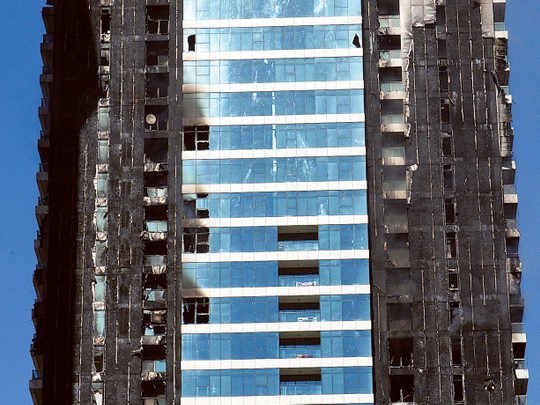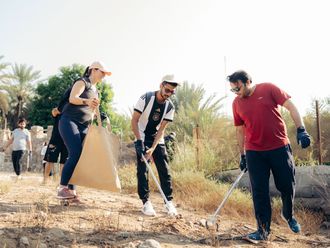
Dubai: Ahead of the public release of a newly revised UAE Fire and Life Safety Code, the largest UAE manufacturer of building cladding panels said it will no longer produce flammable plastic-core cladding.
Owner of Alubond panels firm, Shazi Ul Mulk (left), chairman of parent company Mulk Holdings based in the UAE, told Gulf News on Sunday in an interview that his firm is voluntarily halting production to remove the controversial products from the marketplace amid a rash of spectacular tower fires in recent years.
“This is a decision where we need to take the lead,” Ul Mulk said. “Eventually the code will ban them [inferior panels] anyway. The delay of the code doesn’t mean we need to wait.”
In a few days, Ul Mulk said his firm will also halt all exports of the inferior non-fire rated panels to 24 countries, he said.
The announcement is significant, given that Alubond commands up to 50 per cent of the cladding market in the country, Ul Mulk said.
Since January 2012, when flames ripped across the Al Baker Tower in Sharjah, more than 11 high-rises have burst into flames, forcing thousands of residents to flee for their lives and leading to questions surrounding the safety of flammable cladding on skyscrapers where fire equipment cannot reach.
Fast-spreading flames rocked the Ajman One residential cluster in late March not long after the New Year’s Eve fire at Address Hotel which was quickly extinguished in a record-setting response by Dubai firefighters.
The latest fires once again fuelled concerns about the wisdom of allowing flammable exterior cladding to be affixed to multistorey buildings.
Alubond will now concentrate on producing fire-resistant aluminium panels known as A2 panels that do not fail even when exposed to temperatures reaching 332 degrees Celsius and are made of minerals with a far greater capability to keep flames at bay, he said.
The new panels inhibit the spread of flames across finished exteriors of high-rises where upper extremes are unreachable by firefighters and equipment.
An estimated 1,000 towers across the UAE are believed to be clad in older-specification cladding panels.
Ul Mulk has advised authorities since 2012 in search of viable solutions to remediate the fire hazard.
To bolster the new fire code further, proposed new revisions in the fire code may also eliminate the use of all other cladding panels that are not A2 fire-rated, Ul Mulk said, negating former recommendations that inferior panels could be used on buildings less than 10 storeys.
Major General Rashid Al Matroushi, director of Dubai Civil Defence, speaking at the sixth annual Fire Safety Technology Forum in April said UAE Fire and Life Safety Code revisions were expected to be unveiled in late April but were delayed pending final changes to the document.
“We are in the final cooking stages,” he said, noting the revised code would be released imminently.
Older panels are flammable
Removing older, flammable cladding from the marketplace is a step in the right direction for safer multistorey residential and office towers, Ul Mulk said, because the panels can catch fire in minutes due to internal composition.
“We know the local market is going in this direction,” Ul Mulk said.
The plastic core of what are called LPDE panels (low density polyethyelene) are made from petroleum products and are sandwiched between two aluminium panels, he said. When exposed to flames and high temperatures, the plastic core can catch fire and spread across an area where the panels are applied.
In contrast, the A2 new panels to be produced by Alubond, said Al Mulk, are virtually fireproof because of their basic composition of a stone-like core. The secret of the new A2 cladding panels in withstanding fires lies in the composition of its magnesium hydroxide core which undergoes a chemical reaction when exposed to high temperature and becomes rocklike in an impervious form to fire.
“The country is moving to the A2 because it is moving in the right direction,” Ul Mulk said. “The A2 is like a stone panel. It is an actual mineral. The chemical reaction [to fire] is unique. When it reaches 600 degrees Fahrenheit, it undergoes a chemical change where it solidifies as a lump.”
When the magnesium hydroxide reacts, the natural outcome is that it releases water which helps resist flames even further.












